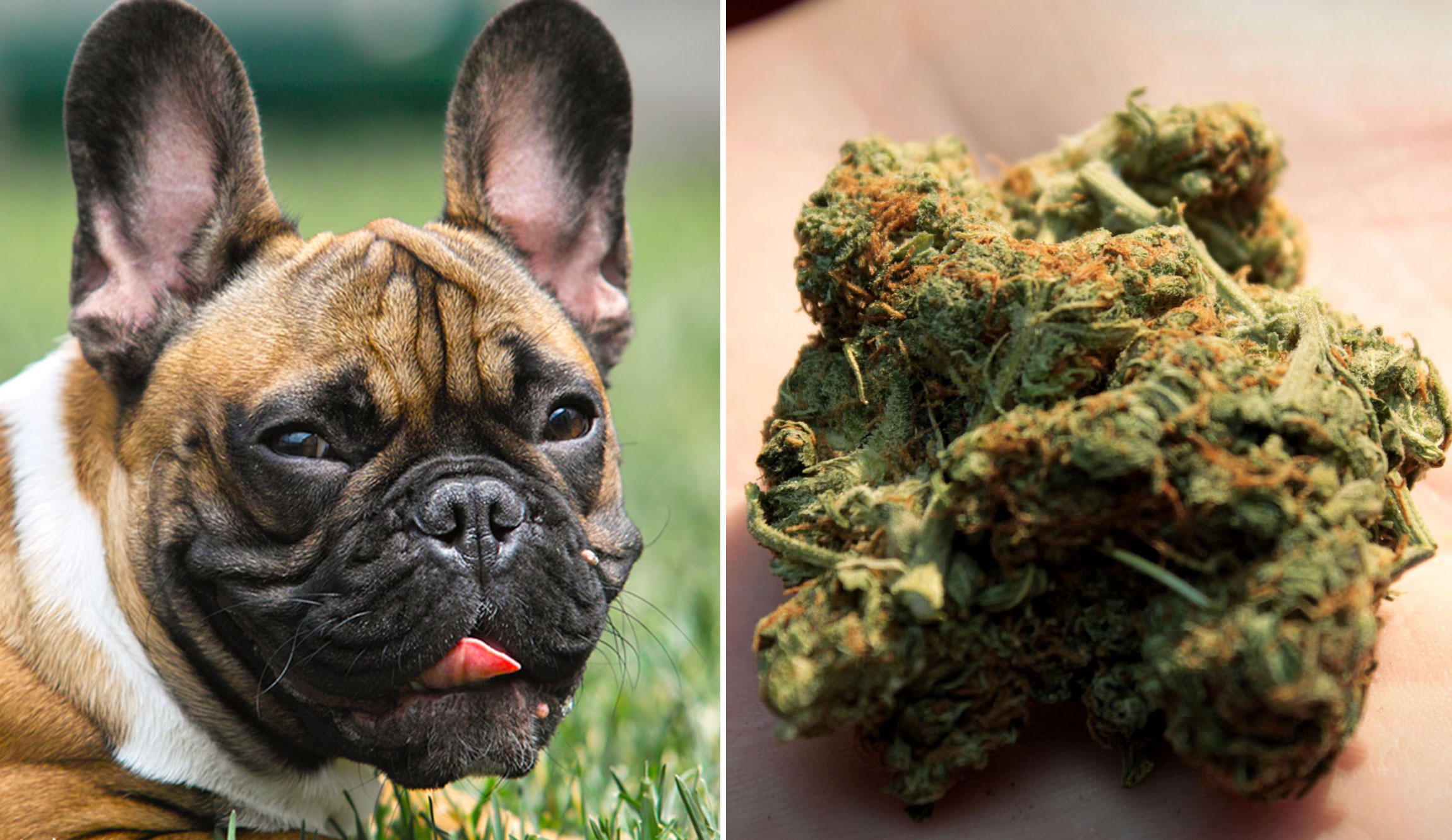Legal Weed Means More Stoned, Poisoned Pets

Obstetrician Jen Gunter was out for a run with her labrador Hazel. The pair pounded down a footpath in Marin, California that Gunter’s kids walk down every day. Hazel was never let off-leash.
A couple of hours after they got home, Gunter noticed her dog acting weirdly.
“She looks like a Salvador Dali painting on the couch. Her body’s on the couch and her head and body are drooped off, and she’s completely melted,” Gunter recalled by phone. “The second I touch her, she starts twitching in a very neurologically-impaired way.”
At first, Gunter suspected a stroke. Then, rat poison. She took Hazel to the nearest emergency doctor, only to be told it was THC poisoning. Gunter suspects Hazel stepped in some discarded resin that she licked off her paw.
When she shared her story online, many commenters argued that marijuana poisoning didn’t exist. “There were people who were like ‘oh, your dog’s just on a trip,’” Gunter said. “If marijuana involves twitching uncontrollably when you’re touched, being semi-conscious and incontinent, that’s not a good advertisement.”
She’s not the only dog owner to have a pet scare recently. In May, an Ontario woman shared a Facebook post about her pup Jasper’s brush with marijuana poisoning. Chelsea Schoof’s description of how her dog was “squinting and hazy, dribbling urine and whining” was shared 13,000 times on Facebook.
Pets can be poisoned from eating marijuana or THC-laced products, as well as by inhaling smoke or consuming residue. According to the Canadian Veterinary Medical Association, poisoning symptoms can include dilated pupils, wobbling, drooling, lethargy, seizures and coma.
Cannabis contains 113 different cannabinoids, of which the best known are the psychoactive THC and pain-relieving cannabidiol (CBD). THC is poisonous to pets, while CBD is fine.
“CBD can be a very beneficial therapy for a lot of patients, both human and veterinary,” said Dr Sarah Silcox, a vet in Ontario and the president and director of the Canadian Association of Veterinary Cannabinoid Medicine. She added that current evidence suggests CBD is very well-tolerated by animals.
Some enterprising companies have begun producing CBD-infused dog treats and oils. Permit Patty, the woman who called police on a kid’s lemonade stand, reportedly ran a company selling CBD-infused pet products without a permit.
Humans have a network of cell receptors through their bodies that interact with cannabis. Mammals like cats and dogs also have cannabinoid receptors, but react to cannabis differently—and tolerance can vary wildly from pet to pet.
Hazel and Jasper, like most canine cases, were fine. But poisoning can be fatal: a 2012 study of THC toxicity in Colorado from 2005 to 2010 recorded two deaths out of 125 pets. During that time, the number of people registered for medical marijuana in Colorado increased by 146 times; the number of THC-poisoned dogs increased by four times.
“We do expect that we’ll be seeing more cases of cannabis intoxication and cannabis toxicity when legalization occurs [in Canada],” Silcox said. “When there is more cannabis, there will be more cannabis toxicities.”
National data on how common THC poisoning in pets is doesn’t exist, and clinics rarely track exact numbers.
In emails to VICE, Lower Mainland vets reported a variety of numbers. Dewdney Animal Hospital in Maple Ridge sees cases “several times a year,” Yaletown Pet Hospital has a suspected case “a couple of times a month,” and 24-hour Burrard Animal Hospital estimates treating two to three animals a week.
These mirror the wide numbers reported in Canadian news stories, where clinics see cases anywhere from five times a year and 60 times a year.
Cannabis-related calls to the Animal Poison Control Centre in America increased to 1,340 in 2017—up from 804 in 2016. Of these, 96 percent concerned dogs, and 64 percent involved edibles.
Edibles can contain very concentrated doses of THC, so even eating a small amount could deliver enough to poison animals. They can also contain other poisonous ingredients—like chocolate, raisins, or the sweetener xylitol—meaning vets have to deal with multiple toxicities.
But the poison control numbers show that marijuana-related calls increased all across the country, not just in states with legalized or medical marijuana. Silcox suggested that changing social attitudes are making people more lax with their stash. “They’re leaving it out, and that increases the risk for our pets,” she said. Similarly, smokers may be getting less diligent about throwing away butts while outside.
Besides the potential dangers of legalization, there are also upsides. Currently, CBD treatments for animals are unregulated, leaving pet owners unsure about the dosage levels, safety and quality of homemade weed treats.
But legalization means CBD treats will get detailed labels and strict product standards. And it’ll also pave the way for more research into the effects of cannabis on animals—both its toxic properties and its therapeutic ones.
According to Health Canada, currently no cannabinoid medications have been approved for veterinary use. In a statement, they said that all new prescription drugs containing cannabinoids would be assessed under the existing drug review process and all research will require authorization under the Cannabis Act.
Edibles guidelines, which will be in place by October 2019, aim to establish “controls to reduce the appeal of cannabis to youth and pets.” The statement did not provide further details about what these controls might be.
Regardless of legality, Silcox warns against getting your dog stoned on purpose: “If as a pet owner, people want to use cannabis with their pets, please be sure you talk about that decision with your veterinarian.”
Follow V. S. Wells on Twitter.